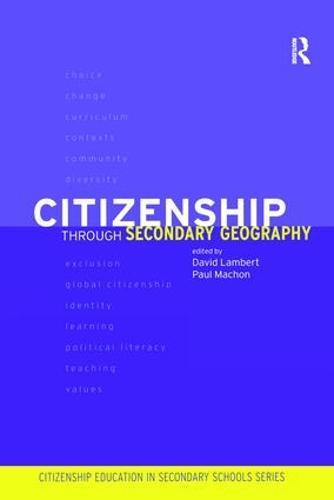Overview
This book reveals the potential of geography to engage with citizenship. It provides: theoretical signposts in the form of short, digestible explanations for key ideas such as racism, values, identity, community and social exclusion a number of inset activities 'for further thinking' a critique of the discipline and the pitfalls to avoid in teaching citizenship through geography practical teaching suggestions. All the contributions to this valuable book point to the capacity of geography to engage with citizenship, values, education and people - environment decision-making, on scales that range from the local to the global. It offers positive and direct ways to become involved in the thinking that must underpin any worthwhile citizenship education, for all experienced teachers, student teachers, heads of department, curriculum managers, principals and policy-makers.
Full Product Details
Author: David Lambert ,
Paul Machon (Wyggeston and Queen Elizabeth I College Leicester, UK)
Publisher: Taylor & Francis Ltd
Imprint: Routledge
Weight: 0.453kg
ISBN: 9781138420021
ISBN 10: 1138420026
Pages: 240
Publication Date: 28 June 2017
Audience:
College/higher education
,
Professional and scholarly
,
Tertiary & Higher Education
,
Professional & Vocational
Format: Hardback
Publisher's Status: Active
Availability: In Print

This item will be ordered in for you from one of our suppliers. Upon receipt, we will promptly dispatch it out to you. For in store availability, please contact us.
Reviews
'Lambert and Machon's [book] is a timely and considered contribution...the book provides chapters setting the background to citizenship in geography education from a stimulating range of different viewpoints...[it] is an essential read for those at the intersection of citizenship and geography in secondary schools.' - Angus Willson, The Development Education Journal
'Lambert and Machon's [book] is a timely and considered contribution ... the book provides chapters setting the background to citizenship in geography education from a stimulating range of different viewpoints ... [it] is an essential read for those at the intersection of citizenship and geography in secondary schools.' - Angus Willson, The Development Education Journal 'Though this book has been prompted by developments in the English National Curriculum, its import goes far beyond the narrow confines of British educational policy. The questions it poses and the issues it raises are of universal significance and merit being read by all teachers of geography and social studies ... This is a thought provoking book with at the same time plenty of pointers for classroom action.' - International Research in Geographical and Environmental Education 'Lambert and Machon's [book] is a timely and considered contribution...the book provides chapters setting the background to citizenship in geography education from a stimulating range of different viewpoints...[it] is an essential read for those at the intersection of citizenship and geography in secondary schools.' - Angus Willson, The Development Education Journal
Author Information
David Lambert, Paul Machon




